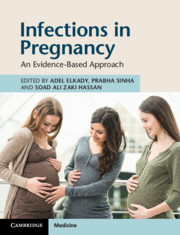Book contents
- Infections in Pregnancy
- Infections in Pregnancy
- Copyright page
- Contents
- Contributors
- Foreword
- Preface
- Section 1 Vaccination
- Section 2 Infections in Pregnancy
- Chapter 2 Viral Hepatitis
- Chapter 3 HIV Infection
- Chapter 4 Herpes Infections and Measles
- Chapter 5 Zika Virus
- Chapter 6 Parvovirus
- Chapter 7 Influenza
- Chapter 8 Cytomegalovirus
- Chapter 9 Dengue Fever
- Chapter 10 Rubella
- Chapter 11 Molluscum Contagiosum
- Chapter 12 Ebola
- Chapter 13 Chikungunya
- Chapter 14 Antibiotics during Pregnancy and Methicillin-Resistant Staphylococcus aureus (MRSA)
- Chapter 15 Gonorrhoea, Syphilis and Lymphogranuloma Venereum
- Chapter 16 Mycoplasma, Ureaplasma, Chancroid, Granuloma Inguinale (Donovanosis)
- Chapter 17 Genital Chlamydia trachomatis and Bacterial Vaginosis
- Chapter 18 Streptococcal Infection
- Chapter 19 Enterococci and Bacterial Infections
- Chapter 20 Listeriosis
- Chapter 21 Urinary Tract Infection
- Chapter 22 Infections and Preterm Labour
- Chapter 23 Appendicitis in Pregnancy
- Chapter 24 Complications Associated with Legal Termination of Pregnancy
- Chapter 25 Tuberculosis
- Chapter 26 Vulvo Vaginitis, Candida (Yeast) Infection
- Chapter 27 Malaria
- Chapter 28 Parasitic Infestation: Protozoa
- Section 3 Postpartum Infections
- Index
- References
Chapter 9 - Dengue Fever
from Section 2 - Infections in Pregnancy
Published online by Cambridge University Press: 11 October 2019
- Infections in Pregnancy
- Infections in Pregnancy
- Copyright page
- Contents
- Contributors
- Foreword
- Preface
- Section 1 Vaccination
- Section 2 Infections in Pregnancy
- Chapter 2 Viral Hepatitis
- Chapter 3 HIV Infection
- Chapter 4 Herpes Infections and Measles
- Chapter 5 Zika Virus
- Chapter 6 Parvovirus
- Chapter 7 Influenza
- Chapter 8 Cytomegalovirus
- Chapter 9 Dengue Fever
- Chapter 10 Rubella
- Chapter 11 Molluscum Contagiosum
- Chapter 12 Ebola
- Chapter 13 Chikungunya
- Chapter 14 Antibiotics during Pregnancy and Methicillin-Resistant Staphylococcus aureus (MRSA)
- Chapter 15 Gonorrhoea, Syphilis and Lymphogranuloma Venereum
- Chapter 16 Mycoplasma, Ureaplasma, Chancroid, Granuloma Inguinale (Donovanosis)
- Chapter 17 Genital Chlamydia trachomatis and Bacterial Vaginosis
- Chapter 18 Streptococcal Infection
- Chapter 19 Enterococci and Bacterial Infections
- Chapter 20 Listeriosis
- Chapter 21 Urinary Tract Infection
- Chapter 22 Infections and Preterm Labour
- Chapter 23 Appendicitis in Pregnancy
- Chapter 24 Complications Associated with Legal Termination of Pregnancy
- Chapter 25 Tuberculosis
- Chapter 26 Vulvo Vaginitis, Candida (Yeast) Infection
- Chapter 27 Malaria
- Chapter 28 Parasitic Infestation: Protozoa
- Section 3 Postpartum Infections
- Index
- References
Summary
Dengue fever is a mosquito-transmitted viral infection. It is common in most tropical and subtropical countries.
Approximately 390 million dengue virus infections occur each year, of which 500 000 require hospitalisation.
The Aedes aegypti mosquito is the primary host of dengue.
The virus is transmitted to humans through the bites of infected female mosquitoes of the species Aedes aegypti. This vector can also transmit other infections (chikungunya, yellow fever and Zika infection).
The virus has an incubation period of 4–10 days.
An infected mosquito can transmit the virus for the rest of its life.
Severe dengue (also known as dengue haemorrhagic fever) was first recognised in the 1950s during dengue epidemics in the Philippines and Thailand.
Today, severe dengue is one of the leading causes of hospitalisation and death among children and adults in these regions.
There are four distinct, closely related, serotypes of the virus that cause dengue (DEN-1, DEN-2, DEN-3 and DEN-4). Recovery from infection by one provides lifelong immunity against that particular serotype. Cross-immunity to the other serotypes after recovery is only partial and temporary.
Further infections by other serotypes increase the risk of developing severe dengue.
- Type
- Chapter
- Information
- Infections in PregnancyAn Evidence-Based Approach, pp. 60 - 62Publisher: Cambridge University PressPrint publication year: 2019



